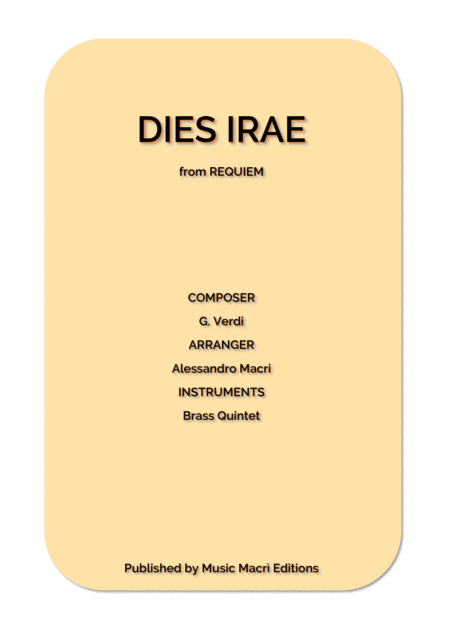Brass Ensemble Horn,Trombone,Trumpet,Tuba - Level 2 - Digital Download SKU: A0.931249 Composed by Giuseppe Verdi. Arranged by Alessandro Macrì. A Cappella,Concert,Film/TV,Romantic Period,Sacred. Score and parts. 20 pages. Music Macri Editions #5771023. Published by Music Macri Editions (A0.931249). La Messa da Requiem di Giuseppe Verdi è un'opera certamente religiosa, ma in un modo tutto suo, scritta cioè da un uomo che non era propriamente praticante: composta ed eseguita (su un precedente progetto per Rossini) nel 1874 per commemorare Alessandro Manzoni a un anno dalla scomparsa, è un lavoro che unisce, alla devozione quasi filiale per i due Grandi, una sensibilità operistica tutta verdiana. E in verità , i cantanti solisti che Verdi aveva in mente nello scrivere la partitura erano certamente voci d’opera.La prima nella chiesa di San Marco a Milano ebbe un tale successo che si tennero altre tre esecuzioni al Teatro alla Scala. Francis Tovey scrive: La Messa era arrivata nella sua vera casa (...) dove il pubblico, che non doveva badare alle convenzioni ecclesiastiche, poté dare sfogo al proprio entusiasmo, con esuberanza tipicamente italiana. Verdi non aveva intenzione di riservare la partitura a rare, solenni commemorazioni. La qualità drammatica e operistica del Requiem mal si adatta all’uso di un servizio regolare in chiesa, né il compositore voleva che funzionasse come liturgia. Fin dall'inizio, Verdi ha concepito il suo Requiem per l’esecuzione, non per la devozione; voleva che il suo lavoro fosse complementare alla popolarità di Manzoni per mostrare al mondo la cultura italiana, tanto che lo portò personalmente in tournée a Parigi, New York, Londra e Vienna.Il Requiem di Verdi, come Ein deutsches Requiem di Johannes Brahms, è l’affermazione di un dolore personale che si serve di un testo preso in prestito dalla liturgia sacra.Neanche Brahms, come Verdi, era particolarmente devoto. Per entrambi, le parole della messa da requiem per i defunti rappresentano il bisogno universale di esprimere le emozioni che ci assalgono quando una persona amata muore: dolore, perdita, tristezza, rabbia, paura del giudizio divino e speranza di pace sia per i defunti che per coloro che sono in lutto.Verdi inizia con i versi Requiem aeternam dona eis, Domine che il coro e l'orchestra intonano in fasi sommesse e raccolte. I quattro solisti si uniscono al coro e all'orchestra per uno stentoreo Kyrie eleison. Il tonitruante boato orchestrale e corale del Dies irae che segue immediatamente il Kyrie è il momento più atteso e memorabile del Requiem. Qui i musicisti, i coristi e i cantanti devono produrre esplosioni sonore continue e inarrestabili. Gli ottoni, le percussioni, i legni e il coro sono tirati al massimo, mentre le voci gridano sgomento e dolore, e gli archi crescono di intensità e impeto. Del resto, il materiale musicale del pauroso Dies irae ritorna di continuo lungo tutta la Messa, dipingendo un quadro da Giorno del Giudizio: non a caso l’opera è stata equiparata all’affresco michelangiolesco della Cappella Sistina. Un lavoro cupamente drammatico, con intermittenti, brevi, violenti lampi di luce.Di volta in volta, Verdi ci fa vivere il terrore dell'inferno (timbri e registri bassi) e la luminosa speranza di salvezza, preparandoci alla gioia del Sanctus, con la tromba che annuncia Santo, santo, santo, Signore degli eserciti! Il cielo e la terra sono pieni della tua gloria!Verdi conclude il suo Requiem con un soprano che intona i primi versi di Libera me (Liberami, o Signore, dalla morte eterna in quel terribile giorno). Tutto il dramma, il terrore, l’angoscia delle sezioni precedenti ritorna, come se il compositore intendesse lasciarci con un senso di incertezza: saremo, alla fine, riscattati? Verdi riprende qui la musica del Dies irae, ma alla fine, il coro e il soprano finiscono in un sussurro quasi impercettibile, con Libera me. Libera me: una speranza, una preghiera, un gemito sommesso.
